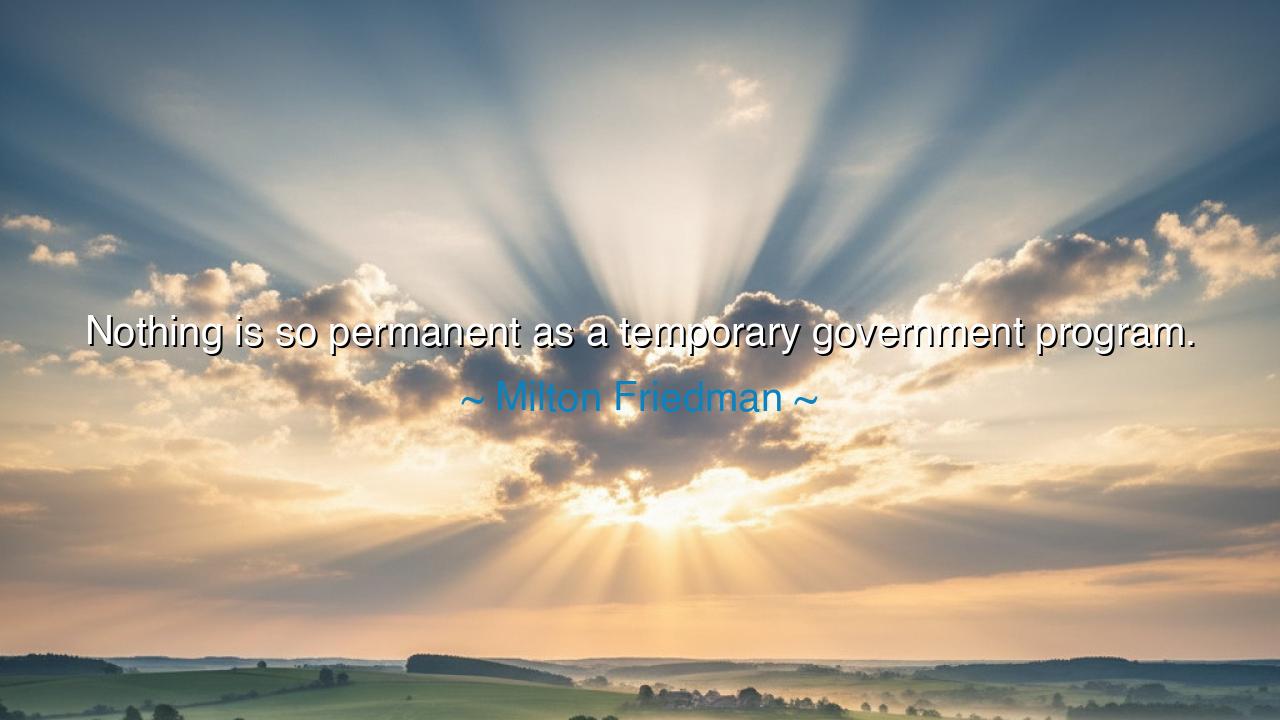
Nothing is so permanent as a temporary government program.






"Nothing is so permanent as a temporary government program." Thus spoke Milton Friedman, the great apostle of economic liberty and reason, whose words cut like sunlight through the fog of bureaucracy. In this single sentence lies a truth both ironic and eternal: that what is born as temporary under the banner of necessity often becomes permanent under the weight of habit, pride, and power. For in the realm of government, promises seldom die — they linger, they grow roots, and they draw sustenance from the very people they were meant to serve.
Friedman spoke in an age when the modern state had stretched its hands deep into the affairs of men — an age of welfare programs, emergency measures, and noble intentions turned into endless expenditures. He saw how rulers, under the pressure of crisis, would create a temporary law, a temporary tax, a temporary relief, always in the name of compassion or security. And yet, long after the storm had passed, the programs remained — not as tools of aid, but as fixtures of control. For every government measure, once born, develops its own defenders: the bureaucrats whose livelihood depends upon it, the politicians who take credit for it, and the citizens who have grown dependent upon its gifts.
Look, for example, to the history of the income tax in the United States. It was born not as a permanent burden, but as a temporary measure during the Civil War, a means to fund the Union’s desperate struggle for survival. The promise was clear — it would vanish when peace returned. Yet when the war ended, the tax lingered; it was repealed, reborn, and by the early twentieth century, written into the Constitution itself. What began as a passing necessity became an eternal presence, woven into the very fabric of national life. Thus, Friedman’s warning came not from cynicism, but from observation — from the steady march of temporary programs that refused to die.
This is the tragedy and irony of power: what is easy to begin is almost impossible to end. For every “emergency” becomes the new normal, every “exception” the new rule. Even the smallest government office grows like ivy upon the wall of liberty, slowly creeping, silently consuming. Men forget that every benefit has a cost, every law a chain, and that once forged, these chains seldom break of their own accord. What begins as mercy often ends as dependence; what begins as aid may end as bondage.
Yet Friedman's words are not a cry of despair — they are a call to vigilance. He did not condemn government for existing, but for forgetting its limits. A wise state, like a wise man, must know when to act and when to let go. It must build not monuments of policy, but mechanisms that can fade gracefully when their purpose is fulfilled. This, alas, is the rarest of virtues — for power, like wealth, clings fiercely to life. It is the duty of the free to remind it of its mortality.
History offers us heroes who have understood this law. When George Washington laid down his sword and refused a crown, he taught that even authority must learn to end itself. When the Romans appointed Cincinnatus, who led them in war and returned to his plow, they honored the spirit of the temporary — the humility to serve and then step away. But modern governments, too often intoxicated with their own importance, forget this sacred rhythm. They expand endlessly, mistaking duration for virtue, until the people serve the system rather than the system serving the people.
Therefore, my children, remember this truth: every program that promises to last only a season may endure for generations, unless courage brings it to an end. Question the permanence of every “temporary” decree. Demand sunsets upon every new power. Do not mistake compassion for control, nor convenience for freedom. The road to servitude is not paved with tyranny alone — it is paved with good intentions that never die.
So let Milton Friedman’s wisdom guide you: beware the comforts that come wrapped in permanence, and revere the liberty that depends upon restraint. For the greatest strength of a free people lies not in how much the government can do for them, but in how much they can do without it. Let governments rise and fall like seasons, and let freedom endure like the sun — eternal, self-renewing, and always beyond the reach of permanence.






AAdministratorAdministrator
Welcome, honored guests. Please leave a comment, we will respond soon